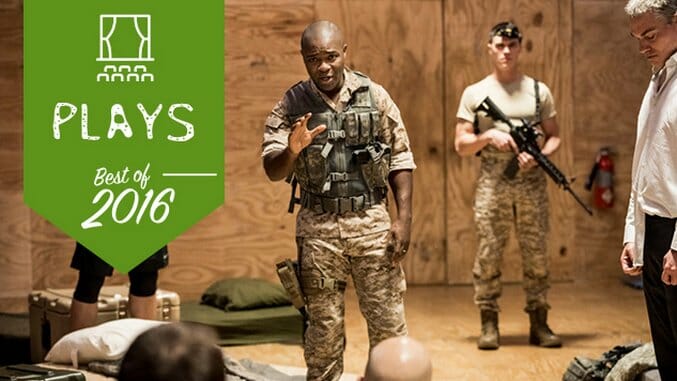
Although many will remember 2016 as a year of round-the-clock politics, 2016 was also a year that theatre flourished. The plays, both revivals and new, were groundbreaking. Each show on this list had something larger to say about humanity and had a particular focus on the parts of our nature that we’d rather leave in the shadows. With the larger context of a divided America, these stage plays felt even more important and poignant.
The Crucible
Tony award-winning director Ivo van Hove made Arthur Miller’s 1953 play, which is set in the 1690s in the midst of a fictionalized version of the Salem witch trials, timeless. Originally meant as Miller’s commentary on 1950s McCarthyism, van Hove showed that a feverish fear can overtake everyone and anyone—even silly schoolgirls. Two-time Oscar nominee, Saoirse Ronan made her Broadway debut as the vengeful Abigail Williams who not only wields her power of manipulation, but witchcraft as well, leaving audiences hoping that Ronan will come back to Broadway soon.
The Humans
As promised by the play’s title, The Humans examined the multifaceted nature of humanity. Written by Stephen Karam and directed by Joe Mantello, the new play chronicled a middle-class family’s Thanksgiving dinner in Manhattan. Family dinners are never easy affairs, especially on that particular holiday. Striking the delicate balance between being humorous and devastating, the play provides an empathetic view of the family’s very real struggles with money and personal expectations. But ultimately Mantello’s show reminds us that every day is uncertain, for better or worse. It’s no surprise that The Humans walked away with four Tonys, including the one for Best Play.
Sweat
This off-Broadway play written by Lynn Nottage foreshadowed the 2016 election outcome while the majority of the media and political pundits were had their focus elsewhere. Following a group of manufacturing workers during the years 2000 and 2008 in a Pennsylvania city, Sweat shows a side of America that theatre doesn’t often explore. Gritty and unflinching, the drama darkens as the economic futures of the characters exceedingly become more bleak, driving certain characters to desperate measures. The show’s off-Broadway run was so successful that it’s transferring to the Broadway on March 26th at Studio 54.
Othello
Said to be one of the best adaptations of Othello in recent years, director Sam Gold brings the Shakespearean tragedy to the modern era, specifically to military barracks, but keeps the focus on the protagonist and antagonist. Starring David Oyelowo as Othello, the commander plagued by jealousy, and Daniel Craig as Othello’s conniving, vengeful underling, Iago, the two men undergo a devastating and uber personal power struggle. Unlike other versions of Othello, Iago doesn’t steal the show away with his schemes. Instead, Oyelowo’s Othello matches Craig’s Iago and exhumes authority, which is a innate personality trait that the flinty-eyed Iago will never be able to master.
Blackbird
Set in a grimy office conference room with an overfilled garbage can, David Harrower’s Blackbird brings two people’s gut-wrenching, grotesque transgressions back to Broadway. The 2016 version left audiences feeling unsettled and horrified, which might not be the emotions everyone wishes to experience after seeing a Broadway show, but it was one of the most powerful and charged shows of the year. Jeff Daniels reprised his role as the middle-aged office worker, Ray, who begins to implode after Una, played by Michelle Williams, finds him 15 years after their affair. Playing a not-so-sane young woman who’s simultaneously seeking closure and revenge, Williams came off as a 12-year-old girl masquerading as a 27-year-old woman, showing that her character’s emotional growth had been halted. As more and more details and secrets are forced from the lips of Ray and Una, the more quietly shocked the audience felt, showing that you can’t necessary run from the past.
In Life
This play, written by Adam Bock, might have at first seemed like a close-up view of one man’s life, but as the eloquently story unfolded, it becomes a testament to the way life often upends us unexpectedly. Beginning with a 25-minute-long monologue, Nate, played by David Hyde Pierce, makes the audience feel like his closest confidant, while detailing his experience as middle-aged gay man living in New York City, who finds himself alone after a breakup. But an unexpected death widens the scope of the play and has the main character looking to the stars for answers, though they are not necessarily sympathetic to this man’s plight. This play left the audience wondering about their own existences.
The Father
Dementia is an undoubtedly terrifying disease, and The Father tackles it unflinchingly from the point-of-view of the increasingly unreliable narrator André, played by the legendary actor Frank Langella. Set in a bourgeoise French apartment, André cannot recognize the faces of family and frequently rages about his misplacement of objects, particularly his wrist-watch. Although André’s mind sometimes evades him, his ego is ever-present and grows larger under the exacerbation of the dementia. The brilliance of this play, written by French playwright Florian Zeller, is that André remains unsympathetic to the end.
Alicia Kort is Paste’s Theatre Editor.